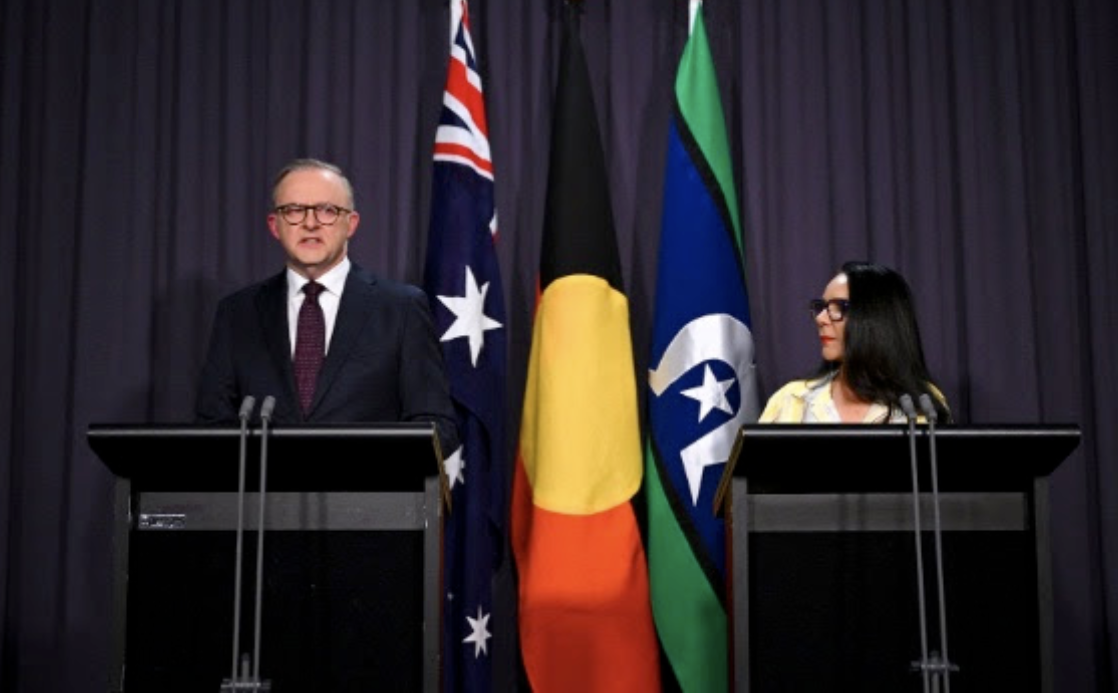
- Details
- By Phyllis Young
Guest Opinion. Last weekend, as news channels and social media were inundated with tragic reports out of Gaza, Australia’s electorate voted down a key referendum of vital concern to Indigenous Peoples the world over. The referendum would have created a national advisory board to counsel parliament on Indigenous issues, but 60 percent of the Australian electorate rejected what could have been an important advancement for Indigenous representation at the highest levels of government.
The board was proposed to include Indigenous representatives from Australia’s six states and two territories. Each would have been voted in by local Indigenous community member-electors. A majority of Indigenous voters polled supported the proposal, and although the board would have “non-binding advice” on issues affecting Indigenous Australians, many saw it as a step in the right direction toward reconciliation.
The referendum, supported by the Prime Minister and Indigenous leaders, nevertheless faced opposition from both sides. Some Indigenous Australians and allies saw its goals as insufficient. Grassroots Indigenous sovereignty activists have said they want more significant reconciliation efforts, such as a formal treaty. On the conservative side of the fence, many Australians’ no votes seem to indicate they care little about following a path of truth, justice, and healing in regards to the nation’s Indigenous citizens, who comprise nearly 4 percent of the country's population of 26 million.
Let me be clear with you: Aboriginal Peoples of Australia and Indigenous Peoples of the Americas share a collective experience of genocide and exploitation at the hands of settler-colonial interests. We both have resisted, gradually carving out a space to practice our cultures and exercise sovereignty. On Turtle Island, we at least have had the benefit of treaties (though, as you probably know, the U.S. government has never been known for honoring them). British settlers never even gave lip service to the Aboriginal Peoples of Australia, which is one reason any advancement in their status (the Australian Constitution fails to even recognize their existence) would have been welcome.
Indigenous Australians weren’t even allowed to vote until 1962, and the Australian state’s genocidal policies have repeatedly targeted them. Throughout the 1800s, they faced an onslaught of settler violence and dispossession of their homelands — a period parallel to the “manifest destiny” era here on Turtle Island. Continuing through the 1900s, Christian and white supremacist institutions such as boarding schools, missions, reservations, and corrupt child welfare systems abused Aboriginal children and families. I urge you to read more about the “Stolen Generations,” Indigenous children removed from their homes by the Australian government and other institutions in an attempt to eliminate the nation’s Indigenous population.
I may hail from the Standing Rock Sioux Tribe, but I have spent my life advocating for the rights and humanity of Indigenous Peoples on the international stage. While one failed referendum might seem insignificant when placed along the Australian state’s lengthy timeline of violence and dispossession of Indigenous Peoples, it is nevertheless a crucial marker of a settler-colonial society’s inability to take accountability and respectfully listen to Indigenous voices. I stand with my Indigenous relatives on the Australian continent, and I call on you to join me. Let’s show solidarity with all Indigenous people in their various struggles against settler-colonialism and genocide.
Wopila tanka — my gratitude to you.
Phyllis Young is the Standing Rock organizer for the Lakota People's Law Project.
Help us defend tribal sovereignty.
At Native News Online, our mission is rooted in telling the stories that strengthen sovereignty and uplift Indigenous voices — not just at year’s end, but every single day.
Because of your generosity last year, we were able to keep our reporters on the ground in tribal communities, at national gatherings and in the halls of Congress — covering the issues that matter most to Indian Country: sovereignty, culture, education, health and economic opportunity.
That support sustained us through a tough year in 2025. Now, as we look to the year ahead, we need your help right now to ensure warrior journalism remains strong — reporting that defends tribal sovereignty, amplifies Native truth, and holds power accountable.
 The stakes couldn't be higher. Your support keeps Native voices heard, Native stories told and Native sovereignty defended.
The stakes couldn't be higher. Your support keeps Native voices heard, Native stories told and Native sovereignty defended.
Stand with Warrior Journalism today.
Levi Rickert (Potawatomi), Editor & Publisher

